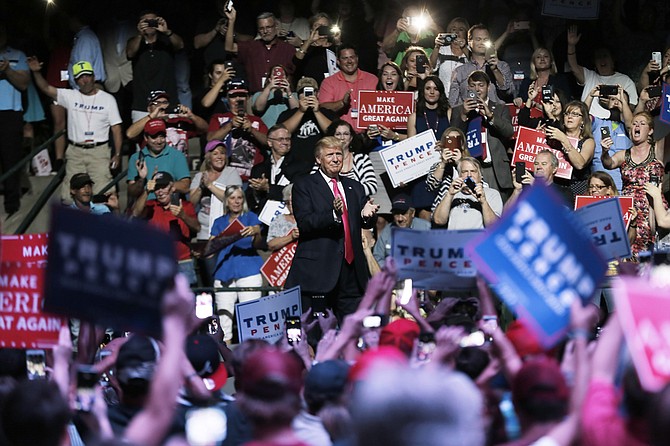Fifty-three percent of white women in the country elected President Donald Trump, a man who, perhaps if he was not elected leader of the free world, would also be suffering the same fate as Ailes and Weinstein, after several women admitted to being sexually harassed and assaulted by the former “Apprentice” host. Photo by Imani Khayyam.
Women should not have to post on social media to bring awareness to the harassment, assault and abuse that half of the world's population endures daily. Those who chose not to share their stories as a part of the #metoo social-media campaign this week, spurred to life by the recent Harvey Weinstein sexual-harassment scandal, are no less important than those who did.
It feels like 2017 has been a banner year for women outing powerful men as sexual harassers and abusers. January began with the largest demonstration on behalf of women worldwide, including a march drawing hundreds of men, women and children to the capitol in Jackson. Women have outed Roger Ailes, Bill O'Reilly, Bill Cosby and, now, Harvey Weinstein as harassers, predators and abusers. But all this progress is as much of a reaction and a defense as it is movement forward.
Fifty-three percent of white women in the country elected President Donald Trump, a man who, perhaps if he was not elected leader of the free world, would also be suffering the same fate as Ailes and Weinstein, after several women admitted to being sexually harassed and assaulted by the former "Apprentice" host. Despite the "Access Hollywood" tape leaking that Trump felt fame allowed men to grab women by the p*ssy, he won the presidency, subsequently rolling back a woman's right to have birth control covered by her health insurance and funding for women's health internationally. Unsurprisingly, Trump is terrible for and to women—particularly women of color (more than 90 percent of black women voted for Hillary Clinton).
The president recently took it upon himself to berate ESPN journalist Jemele Hill, who had called out Trump for sympathizing with white supremacists. Hill was subsequently suspended from the network, and her job might be in jeopardy.
The trial against Bill Cosby has been repeatedly postponed after a judge declared a mistrial earlier this year. Many of Weinstein's accusers were fearful of accusing him any sooner for fear of retribution and in protection of their career. Women fear retaliation for speaking out daily. One in three women have been physically abused by an intimate partner. Black women experience higher rates of intimate partner violence than white or Hispanic women, recent U.S. Department of Justice statistics show.
The way men treat women is detrimental to society and to future generations. One of the ways to bring about justice for all women is to bring more women, particularly women of color, to the table in community and in public spaces. Women make up only 26 of the state's 175 elected representatives and senators in the Legislature--that's equivalent to just 15 percent of the policymakers in the statehouse, despite accounting for half the population. There are no black women (or men for that matter) in state elected-official positions currently, and black women have never held a spot on the Mississippi Supreme Court. If we say we care about women, we need to start by seeking out women's voices, listening to their stories and when they say "me too."
More stories by this author
- EDITORIAL: Gov. Reeves Needs to Take ‘Essential’ Seriously for COVID-19 Social Distancing
- EDITORIAL: City Needs to Name Officers Who Shot Citizens Without Delay
- EDITORIAL: Free Press Is Not Here to Comfort the Powerful; We're Here for Truth
- EDITORIAL: Dear Mississippi Politicians, Criminal Justice Reform Is More Than Rhetoric
- EDITORIAL: Transparency in Officer Shootings Needs to Improve, Not Worsen



Comments
Use the comment form below to begin a discussion about this content.
comments powered by Disqus